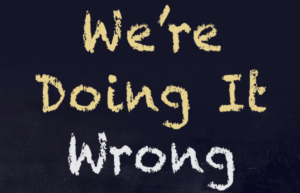Naughts Not So Bad for Education
The papers have been full of editorials expounding on why the past decade was disastrous for America. There is much to forget and regret about the last decade but it wasn’t so bad for education. We should have made more progress than we did, but here’s 10 big advances that bode well for the decade to come:
- While there are few fans left, the 2001 reauthorization of federal education policy called No Child Left Behind marked a consensus that 1) measurement matters, 2) all students deserve good life options, 3) we should not rely on average achievement to measure a schools success, and 3) chronic academic failure is unacceptable.
- The 2005 Graduation Rate Compact publically acknowledged the dropout crisis and marked the beginning of the end of lying about graduation rates and expansion of alternative school aimed at dropout prevention.
- Data systems got a lot better in large part because of the National Data Quality Campaign. Race to the Top will help close the deal—soon every state will have a data system that tracks individual student progress from kindergarten to work.
- There was a massive increase in education entrepreneurship—school developers, human capital initiatives, and learning platforms—funded by massive new money foundations. The recession brought a new wave of talent into the sector that will make a difference for a generation.
- Charter schools hit the 5,000 mark and charter networks demonstrated undeniable performance in the most difficult circumstances.
- The concept of urban school portfolios with multiple models and operators became the dominant strategy of reform minded education leaders which increasingly includes mayors.
- Online learning exploded, with more kids learning online than in charter schools. Digital learning became more personalized with games, virtual environments, and social networking pointing the way forward.
- Reform advocacy matured. In 2001, EdTrust carried the equity agenda. Democrats for Education Reform and Education Equality Project joined the fray and represent the bi-partisan Obama agenda of high standards, educator effectiveness, and accountability.
- The beginning of a new employment bargain was framed by New Teacher Project and the National Council on Teacher Quality and embraced by the Bush administration and pushed even more aggressively by the Obama administration.
- The private sector began making important contributions in online learning and higher education. Several IPOs and new disruptive technologies increased interest of private investors. Small openings for private sector contributions, like Supplemental Educational Services (tutoring low income students), were met with entrepreneurial vigor that indicates that incentives will lead to investment and solutions.
Building on these advances, the decade to come will include a reauthorization of federal policy, a new generation of personalized digital learning, and an expanded array of options for educators to make a difference.








john thompson
How is there a consensus that "we should rely on average achievement to measure a schools success?" NCLB was based on the opposite.
Actually, there is a bipartisan consensus that disaggregatingg data was the best thing about NCLB. If we could just agree on the Petrilli/Ravitch/NEA/and the vast majority of teachers consensus that data should be used for a consumers report-type system, we could move together towards reform. If we could agree on evidence-based decision-making and data-informed accountability, as opposed to attempting to fix data-driven reform, we could end the educational civil war and move forward.
Replies
Tom Vander Ark
Good catch, obviously NCLB was based on the belief that averages masked underachievement of low income and minority students.
Agree that we need more transparency. Thanks
Kendra
Reading over your Top Ten advancements in education I would have to agree to some extent, that the United States is on the road to accountability, "Highly qualified" educators, effectively addressing the drop-out rate and adopting Charter schools to fill the voids of under-performing public institutions. However being an educator and working within the public school system, after-school programs, community education/art projects and family literacy within the San Francisco Bay Area, I am confused as to why many areas in public education are not improving and why many districts are allowed to bottom out. Many children in the 21st Century are still learning out dated information, using curriculum that is irrelevant, and/or out of touch with the current world taught by teachers who receive training that ineffectively prepares them to be scripted talking heads instead of professional, transformative educators. So much is desperate in the attempt to appear as if public education is headed towards the future. But there are many questions that I have about what is deemed important and successful in education. Expensive measures have been warranted yet urban schools and "minority" youth have yet to come up. Why? There are many reasons but one I have not heard addressed is the lack of educators within the classrooms that reflect the ethnic/cultural make-up of the schools. Why is there no effort to recruit teachers "of color" or from the community students are from? I have witnessed it time and time again the cultural gap and mis-communication of teachers unfamiliar to urban populations and already saddled with their own personal misconceptions making drastic and hasty decisions concerning the academic fate of "minority" students. Yet it is not openly discussed within the public school system. A few sessions of diversity training can not solve past ignorances that are shared within the classroom or discussed in the teacher lounge. I have heard many a disturbing tale of prejudice from teachers in the lounge that were offensive and clearly a sign that many teachers are unfit to handle the education of our youth. These stories were always discussed openly without regard to my presence because I feel I was never associated with being a teacher for what I believe are the following reasons: I was working as a substitute teacher, I do not look my age and I am African-American. I was often confused with being an aid or a student therefore caution was thrown to the wind.
Unfortunately bigotry is difficult to trace but encouraging educators and professionals from all walks of life especially those people who share similar backgrounds and experiences with the student population can address other issues ( expulsions and suspensions, attendance..) and encourage the next generation to step up and become educators who give back to there communities. I could go on and on but what I was hoping was to address the issue of the lack of culturally/ethnically diverse staff in public schools and the lack of interest to do so. I feel that NCLB has put so much emphasis on determining what a "highly qualified" teacher is mainly by gauging success in standardized testing ( money, money and more money) rather than whether an educator is equipped on a socially committed level; committed to social uplift through education. I am interested in reading about what Revolution Learning is working towards and your insight on what education at the beginning of a new decade can look like. Education is a passion of mine and a necessity for all. I am just waiting for something that looks and tastes like a real tomato!
Areas not addressed within public schools need to be implemented with serious commitment if we as a country want to travel the path as sustainable, participants within our global community: school gardens, true recycling, composting, media literacy, the school serving as a community space offering resources,critical curriculum that serves to find solutions/jobs. The role education can and should serve is limitless as it is important. The wait is costly and detrimental to us all. We can no longer let the hierarchy of those who are educated conflict with those who are not solely educated academically. Partnerships and alliances with communities as well as schools, officials and local business need to be sought out and seen through as we move towards the always present future in a ever-changing world. Thank you for your time. Much luck in your endeavors.
Kendra Cass
Replies
Tom Vander Ark
Thanks for your thoughtful comments Kendra